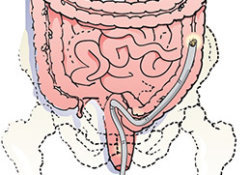
Colon cancer, also known as colorectal cancer or CRC, is a type of cancer that starts in the colon, which is the large intestine. Colon cancer is the third most common type of cancer in the United States, after breast and lung cancer. Colorectal cancer can be prevented. There are a few different ways to avoid it.
Diet to Prevent Colon Cancer
People can do a few different things to reduce their risk of developing colorectal cancer. One of the most important things is to maintain a healthy diet.
Some foods that may help reduce the risk of colon cancer include:
- Vegetables: Vegetables such as broccoli, cauliflower, and Brussels sprouts contain compounds called phytochemicals that may help protect against CRC.
- Fruits: Fruits such as blueberries, strawberries, and oranges contain antioxidants that may help protect against Colorectal cancer.
- Fish: Fish such as salmon, tuna, and mackerel are high in omega-3 fatty acids, which have been shown to reduce the risk of Colon cancer.
- Whole grains: Whole grains such as barley, oats, and quinoa contain compounds called lignans, which have been shown to reduce the risk of CRC.
- Nuts: Nuts such as almonds, walnuts, and pistachios contain compounds called phytosterols, which have been shown to reduce the risk of Colorectal cancer.
- Soy: Soy contains compounds called isoflavones, which have been shown to reduce the risk of Colon cancer.
It is important to remember that not all foods are suitable for everyone. Talk to a healthcare professional about what type of diet is best for you.
Exercise to Prevent CRC
Exercising regularly is another way to help reduce the risk of Colorectal cancer. Exercise can help reduce the risk of other health conditions, such as obesity, that may increase the risk of CRC. Being physically active also has other health benefits, such as reducing the risk of heart disease and diabetes.
Get Screened Regularly to Prevent Colon Cancer
Colorectal cancer can be prevented by getting screened regularly. Colonoscopy is the most common test used to screen for colon cancer. It is recommended that people begin getting screened for CRC at 50. If there is a family history of Colorectal cancer, people should begin getting screened at a younger age.
There are a few different ways to screen for Colorectal cancer. The most common way is through a Colonoscopy. The test allows a healthcare professional to look inside the colon and rectum. It is usually recommended that people begin getting screened for CRC at 50, but people with a family history of Colorectal cancer should begin getting screened at a younger age.
Maintain a Healthy Weight
Maintaining a healthy weight is another way to help prevent Colon cancer. Obesity is a significant risk factor for Colon cancer. Being overweight or obese can increase the risk of Colon cancer by up to 50%. Losing weight can help reduce the risk of Colon cancer.
There are a few different ways to lose weight. Some people may find it helpful to join a weight loss program or to work with a dietitian. There are also many healthy recipes and meal plans available online.
Quit Smoking
Smoking is another risk factor for Colon cancer. People who smoke have a two-fold increased risk of Colon cancer. Quitting smoking can help reduce the risk of Colon cancer.
There are several different ways to quit smoking. Some people may find it helpful to join a support group or work with a counselor. There are also many stopping smoking programs available online.
Other Ways to Prevent Colon Cancer
There are more things that people can do to reduce their risk of developing colorectal cancer.
- Limit alcohol intake: Drinking alcoholic beverages increases the risk of colorectal cancer. Limiting alcohol intake can help reduce the risk.
- Have a family history of colorectal cancer evaluated by a doctor: People with a family history of Colon cancer are at greater risk for developing the disease. Evaluation by a doctor can help identify any increased risk and steps that can be taken to reduce the risk.
Conclusion
Colon cancer is a severe disease that can be prevented with the right strategies. Colonoscopy is one of the most common tests used to screen for Colon cancer, and it is typically recommended at age 50. Still, people with a family history should consider getting screened earlier.
Obesity also increases the risk factors for Colon Cancer, so maintaining a healthy weight by dieting or joining a program is essential. Smoking cigarettes also significantly increases the risk of Colon cancer, so quitting smoking is highly recommended. There are many other ways to reduce the risk of Colon cancer, such as reducing alcohol intake, getting screened regularly, and exercising.
